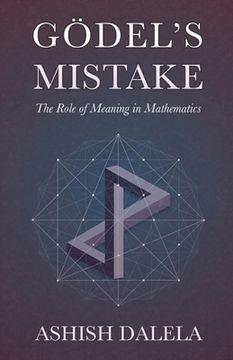Reseña del libro "Godel's Mistake: The Role of Meaning in Mathematics (en Inglés)"
Why Is Mathematics Incomplete?Godel's incompleteness theorem is a foundational result in mathematics that proves that any axiomatic theory of numbers will be either inconsistent or incomplete. Turing's Halting problem is a foundational result in computing proving that computers cannot know if a program will halt. Godel's Mistake connects these theorems to the question of meaning. The book shows that the proofs arise due to category confusions between names, concepts, things, programs, algorithms, problems, etc. The book argues that these problems can be solved by introducing ordinary language categories in mathematics.Where the Solution LiesThe solution to the problem, the author argues, requires a new approach to numbers where numbers are treated as types rather than quantities. To view numbers as types requires a foundational shift in which objects are constructed from sets rather than sets from objects. Since sets denote concepts, this shift implies that objects are created from concepts. This also changes our view of space-time from linear and open to hierarchical and closed. In this hierarchical description, objects are symbols of meaning, rather than physical things. The author calls this theory the Type Number Theory (TNT) and shows that the type view of numbers is free of Godel's Incompleteness and Turing's Halting Problem.How This Book Is StructuredChapter 1: Mechanizing Thought--provides an overview of mathematical, philosophical, linguistic and logical issues that preceded Godel's and Turing's results and shows that the problems encountered in mathematics have a wider undercurrent extending into other areas of science.Chapter 2: Godel's Mistrick--discusses Godel's Incompleteness Theorem and Turing's Halting problem and shows how their proofs rest on category mistakes. The chapter also connects the theorems to the issues of sentence and program meaning. This sets up the motivation for alternative views about numbers and programs that can be free of the paradoxes that arise without semantics.Chapter 3: Mathematics and Reality--the chapter discusses the Platonic notion of mathematics, which keeps ideas and things in separate worlds, and argues that they exist in the same world. The need to bring them together changes our view of objects, space-time, numbers and programs. Now, objects are symbols and numbers and programs are types. The implications of this view to the Cartesian mind-body problem and Platonic separation between ideas and things is discussed.Chapter 4: Numbers and Meanings--develops the intuitions about numbers as types by interpreting various classes of numbers-- natural numbers, zero, negative numbers, irrationals and rationals, and imaginary numbers--in terms of meanings. The chapter concludes by defining the term Type Number Theory (TNT).Chapter 5: Mathematical Foundations--the chapter critiques some foundational ideas in mathematics including logic, set theory and number theory and shows why the very notion of an object as something logically prior to ideas is logically inconsistent. The author argues that numbers are outcomes of distinguishing, and distinguishing requires distinctions. The foundation of mathematics is therefore not in the idea of objects and collections but in the nature of distinctions.The book concludes with a discussion about how distinctions originate in the nature of observation and the foundation of mathematics can therefore be seen in the fundamental properties of consciousness that divides and classifies in order to know.

